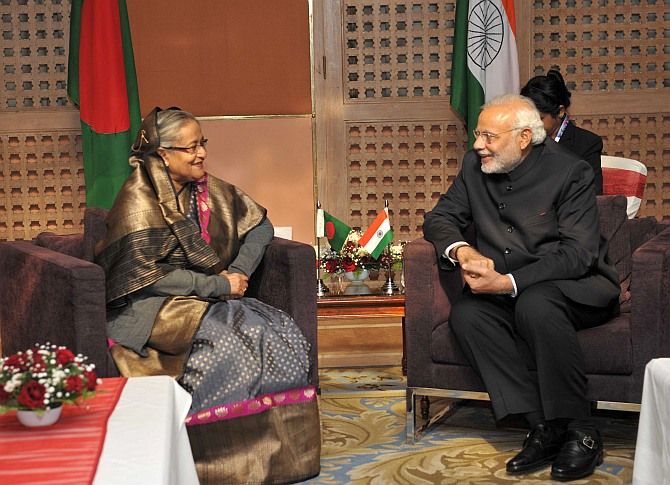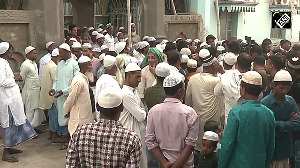Although India is projecting Modi’s forthcoming visit as an effort to focus on trade and mutual cooperation, issue of transit corridor is likely to top his agenda.
 After reaping huge social, economic and political benefits from the Land Boundary Agreement that was approved by the Indian Parliament, the Bangladeshis are looking forward to the two-day visit of Prime Minister Narendra Modi.
After reaping huge social, economic and political benefits from the Land Boundary Agreement that was approved by the Indian Parliament, the Bangladeshis are looking forward to the two-day visit of Prime Minister Narendra Modi.
“Your Prime Minister Narendra Modi would get the same welcome that late Indira Gandhi received when she visited Dhaka after the birth of Bangladesh.
“Modi has created history with the LBA and is currently considered the most popular international leader in Bangladesh.
“He would get the real red carpet,” said Khairatul Mobashit, a political activist of the ruling Awami League.
What is surprising not many people in Bangladesh are talking about the Teesta issue and the visit of the West Bengal Chief Minister Mamata Baneerjee.
Being the closest neighbour of West Bengal, Bangladesh understands the political compulsions behind Mamata Bannerjee's reluctance to share Teesta river’s water.
“Talk of trade, transit and transhipment than Teesta. Economy is more important an issue between the two countries," Mobashit said.
“After LBA, the new found relationship should grow along the economic path”, said Fawzia Elahi, a student of business administration at a private university in Dhaka.
While in Dhaka, the Indian prime minister would take forward Delhi’s long-cherished goal of transit treaty with Bangladesh and would leave the Teesta water-sharing agreement for future.
Although India is projecting Modi’s forthcoming visit as an effort to focus on trade and bilateral cooperation, issue of transit corridor is likely to top his agenda.
Incidentally, the main Opposition Bangladesh Nationalist Party led by Khaled Zia too has welcomed Modi’s visit.
Modi is likely to meet Zia during his two-day visit.
“The transit corridor issue has its hidden agenda. India needs the transit corridor for military purposes in the north-east.
“There is a dispute over Arunachal Pradesh. China claims it to be a part of Tibet. China has been pressuring India a lot for the transit corridor.
“About 200,000 regular army and paramilitary forces are deployed in the northeastern states for decades to combat insurgency. The forces need quick and smooth supply.
“India has already been using the transit facilities in Bangladesh. Heavy machines for power plants in Tripura are transported through Bangladeshi territory”, said Major (retired) Naseeb Khondekar, an activist of the BNP.
Rice and other essential goods are transported through the same route, he added.
The 2010 agreement between Sheikh Hasina and then Indian Prime Minister Manmohan Singh and a broad ranging communiqué that was issued after her visit to New Delhi marked a great improvement of ties between the two countries.
Now, both India and Bangladesh are keen to renew the existing transit facility for better connectivity.
It is worth recalling that after the 1947 partition of India, Pakistan had sought from India transit facility between East and West Pakistan.
India had outright rejected the proposal.
Pakistan had also sought Calcutta port’s facility for a period of six months to make Chittagong port operative.
But India had denied this as well.
Prior to Modi’s visit, Bangaldesh Cabinet has approved the drafts of protocol of Kolkata-Dhaka-Agartala and Dhaka-Sylhet-Guwahati passenger bus services.
The trial run of the service between Kolkata and Agartala via Dhaka began on Wednesday while that between Dhaka and Guwahati started on May 22.
“Both the countries will have equal opportunities in operating bus services but will require route permits.
“During the May 22 trial run, a bus from Kolkata started at 9 am with a 10-member delegation from the Indian government headed by West Bengal transport secretary Alapan Bandyopadhyay.
“It reached Dhaka at night and started for onward journey to Agartala. This bus service is likely to make travel from Kolkata to Agartala easier.
Abdul A Matlub Ahmad, the newly elected president of the Federation of Bangladesh Chamber of Commerce, said that Bangladesh will sign an agreement with India to ease the visa norms for people of both countries and renew trade agreement by instilling easy options in trade, transit and transhipment.
“The trade deal will allow Bangladeshi trucks and vehicles to ply through Indian territory to transport goods to Bhutan and Nepal,” Ahmad said.
“Similarly, vehicles of Nepal and Bhutan will also be allowed to use Bangladeshi territory to carry goods to other countries”.
Indian goods-laden trucks are already allowed to use Bangladeshi territory for their movements.
“The Bangladeshi business community wants the South Asian region to grow like the European Union, especially the northeastern states of India,” Ahmad said.
If India starts development projects in the north-east, Bangladesh will benefit immensely.
For, growth of these states will lead to an increase in demand for goods and that in turn will enable Bangladesh to increase its export to India, he added.
“If road transit is allowed, it will boost Bangladesh’s infrastructure and will create jobs,” he added.
“Bangladesh prefers transhipment via roads and transit through waterways.
“Bangladeshi vehicles carrying goods will have to pay fees to ply along the Indian terrain. Similarly, for both transit and transhipment, India will need to pay fees to Bangladesh while using Bangladesh terrain to carry goods from one state to another,” Ahmad said.
He suggested that both the countries should construct adequate number of warehouses along the bordering areas to facilitate transhipment.
Once the two countries sign the coastal shipping agreement, the new deal will help slash more than 10 per cent of the transportation costs, as waterways are cheaper than the roadways.
If 10 per cent is saved on imports worth more than $6 billion from India, Bangladesh could save more than $600 million a year using the coastal line, he said.
Post agreement, small vessels will ferry goods between India and Bangladesh directly through the coastal shipping line.
This pact, therefore, will hike the demand for small vessels, he said.
The deal is expected to benefit Bangladesh more as the country’s rate of imports from India is pretty high, he said.
Indian businessmen will use the country's Mongla Port, which is mostly underutilised, he added.
The balance of trade between the two countries is heavily tilted towards India as Bangladesh is a net importer of industrial raw materials, basic commodities like onion, garlic, rice, lentil, cotton and machinery.
Bangladesh's imports from India were recorded at $6.03 billion in 2013-14 and $4.78 billion in the previous year, according to data from the commerce ministry.
On the other hand, Bangladesh's exports to India were worth $456.63 million in 2013-14 compared to $563.97 million in the previous year.
However, it is believed that India exports goods worth nearly $6 billion to Bangladesh through informal channels using the 4,096-kilometres border areas, said industry insiders.
Total Indian investment registered with the Board of Investment in Bangladesh is more than $2.5 billion as of 2013, according to data provided by the Indian High Commission in Dhaka.
Image: Prime Minister Narendra Modi meets Prime Minister Sheikh Hasina of Bangladesh on the sidelines of 18th SAARC Summit at Kathmandu (November 26, 2014). Photograph: Ashish Maitra/Photo Division/PIB









